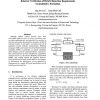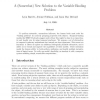503 search results - page 58 / 101 » Verifying Quantitative Properties Using Bound Functions |
152
Voted
RTCSA
1997
IEEE
15 years 7 months ago
1997
IEEE
Although modern control theories have been successfully applied to solve a variety of problems, they are often mathematically and physically too specific to describe and analyze t...
89
Voted
NECO
2008
15 years 2 months ago
2008
To perform automatic, unconscious inference, the human brain must solve the "binding problem" by correctly grouping properties with objects. Temporal binding models like...
121
Voted
ROBOTICA
2006
15 years 2 months ago
2006
We combine a "hybrid" force/position control scheme with a potential field approach into a novel method for collision recovery and navigation in unknown environments. It...
75
Voted
JMLR
2002
15 years 2 months ago
2002
We define notions of stability for learning algorithms and show how to use these notions to derive generalization error bounds based on the empirical error and the leave-one-out e...
118
Voted
ML
2007
ACM
15 years 2 months ago
2007
ACM
Abstract Surrogate maximization (or minimization) (SM) algorithms are a family of algorithms that can be regarded as a generalization of expectation-maximization (EM) algorithms. A...


